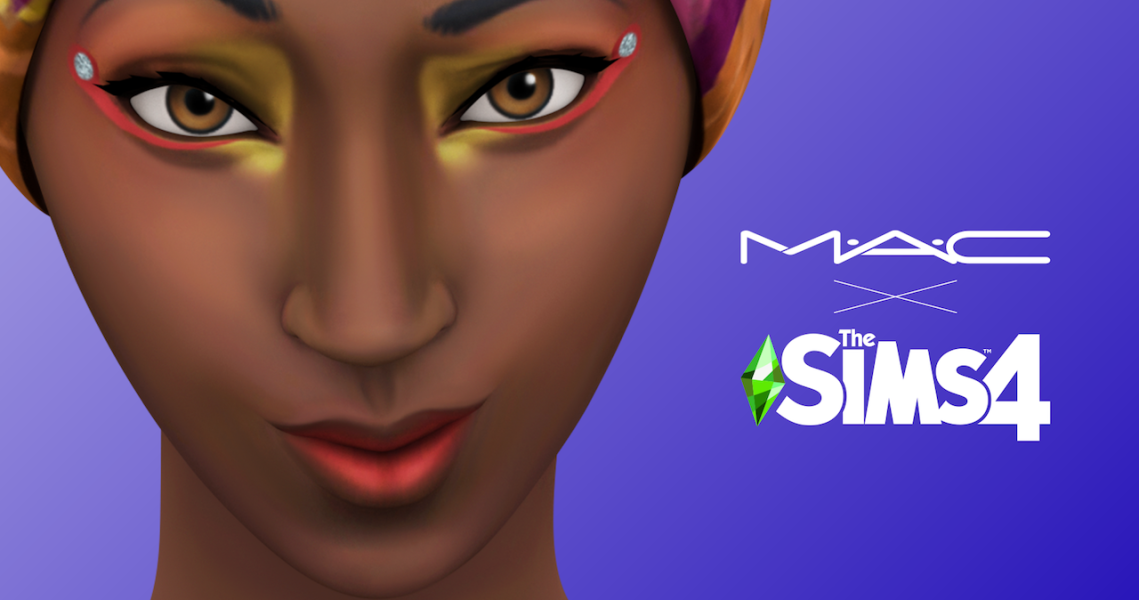As Covid-19 became a global pandemic, the fashion industry made an outsize play for gaming. For example, luxury labels like Valentino and Marc Jacobs created custom looks with Animal Crossing, after seeing inspired and often unauthorized designs show up in the game.
It was only a matter of time before beauty seized its opportunity.
This month, MAC Cosmetics will announce its first in-game collaboration with life simulation game The Sims 4, becoming the first makeup brand to do so. MAC director of makeup artistry Romero Jennings designed 12 customizable beauty looks (four lip, four eye, two eyeliner and two blush) that players can mix and mix to infinitum, and customize the placement of the designs. The looks will be available in every Sims 4 game update. MAC’s history with the gaming industry is fairly new and includes launching products pegged to games like Honor of Kings and sponsoring events like TwitchCon in September 2019.
While indie beauty brands like Glossier have popped on Animal Crossing via beauty merch, and newer gaming platforms like Drest have introduced beauty looks sans brand partnerships, MAC and The Sims’ collaboration represents big beauty meeting big gaming. In January, Electronic Arts revealed in its third quarter fiscal 2020 earnings that The Sims 4 has reached 20 million unique players worldwide. And during its fourth quarter results in May, the company said that “monthly average players in The Sims 4 were higher than the comparable period in the prior year,” partly due to Covid-19.
And The Sims is not the only game to see growth. Gaming usage has surged with customers reticent to venture outdoors post-lockdowns. According to gaming and e-sports market research firm Newzoo, there are 2.7 billion gamers globally, and this year, the global games market will generate revenues of more than $160 billion, a 7.3% year-over-year growth rate.
Lyndsay Pearson, general manager and executive producer of The Sims, said the partnership “celebrates the diversity and creativity” of the Sims’ community. “Players can experiment with these looks to create Sims that are unique and redefine their own rules of beauty,” she said in a statement.
MAC’s in-game play was a direct response to being at Twitchcon last fall, said Diederik Koenders, MAC Cosmetics vp of integrated communications and content. “It was an overwhelming moment to watch the experience of gamers and what is driving their excitement,” he said. “We knew we didn’t want to just throw money at a partnership, we wanted to become more intertwined in the gaming community. In real life, makeup has the ability to transform, and that cosplay is also part of gaming.”
For this partnership, no product is available for purchase via The Sims 4, though looks are inspired by MAC products including its hero Ruby Woo lipstick and Cork eyeshadow. Not using The Sims 4 collaboration as just another sales channel with click-to-buy product links gives MAC more credibility in the gaming space. Of the outsize 2.7 billion gaming audience, Newzoo said only 38% of users will pay for games.
Wearing a beauty product on an avatar is not as easily identifiable as sporting a logo “VLTN” hat or t-shirt from Valentino, so it may be difficult for beauty companies to see gaming as a fruitful opportunity. What’s more, beauty consumers are much more product loyal than they are brand loyal, so making users restrict their gaming toolkits to one brand may feel unnatural. As beauty-gaming partnerships grow, it may be more realistic for brands to own certain categories, say MAC for lipstick or Benefit for brows.
“Part of the challenge for the beauty space is offering the creativity that wearing beauty in real life offers,” said Sarah Fuchs, vp and gm of Covet Fashion.
In Covet, which is a fashion game owned by Glu that centers on a digital dressing model, users have access to approximately 150 fashion labels, including Badgley Mischka and Rachel Zoe, as well as more recently on-boarded labels like Karen Walker and Organic by John Patrick. After engaging in challenges, like styling an opening night look for the opera or an outfit for a fashion show, users are allowed to “level up” to access beauty looks, which aren’t yet co-branded by beauty companies, said Fuchs.
But Covet recognizes that the beauty onslaught is coming. “Beauty is an area we have been discussing for a while, because we know users think of it as a reward,” said Fuchs. Like The Sims, Covet saw exponential growth this year, reporting its highest first-quarter revenue at $17.1 million, a 2% year-over-year growth rate.
But beauty can also be used as an avenue to push more games for women into the fold. According to a Newzoo and Google Play survey, 65% of women ages 10-65 in the U.S. play mobile games and 43% play five or more times per week, but the majority of those women don’t believe games are made for them. Of the top 100 grossing games on Google Play, 44% feature more male characters than female characters.
A lesson can be learned from fellow Glu game Kim Kardashian: Hollywood!, said Fuchs. “We know that beauty adds a level of depth to games. When Hollywood! added KKW [Beauty] into the game, players felt like it was a very meta-interpretation of Kim’s life,” she said. Nars Cosmetics was also added as a styling option to Kim Kardashian: Hollywood! in 2016.
“Gaming is supposed to be welcoming,” said Jennings. “At Twitchcon, I saw all ages, all abilities, all races. Grownups and companies haven’t taken it as seriously as they should, but they will. Women seem to be understanding that more and more.”




